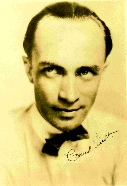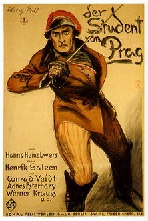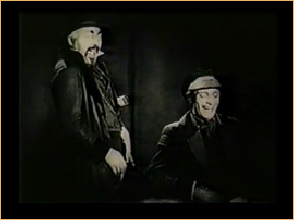
The Conrad Veidt Society
By Barbara Peterson
THE PLAYERS
Conrad Veidt
Balduin, the best fencer in Prague, but an impecunious student
Fritz Alberti
Graf von Schwarzeberg, father of Margaret
Ferdinand Von Alten
Baron Waldis-
Agnes Esterhazy
Komtesse Margaret, not happy about having to wed Waldis.
Werner Krauss
Scapinelli, the devil
Elizza De Porta
Lyduschka, a flower girl, who loves Balduin.
THE SYNOPSIS
Prague, August 23, 1826. Classes at University have ended for the day and students
troop cheerfully to their local meeting place, an inn that provides huge steins of
beer, a place for fencing, and a vast courtyard filled with picnic tables. They are
typical students, most of them cheerful and fun-
Balduin arrives last of all. He takes a table away from his friends, and rests his
chin in his hands. ''What's wrong with him?'' asks the flower girl. The class musician
begins to sing, ''What's wrong with the student? It's only money, precious money!''
This catches the ear of Scapinelli, a money-
At the same time, dozens of the nobility have foregathered at Graf von Schwarzeberg's
mansion for a boar-
The students prevail upon the flower-
Balduin returns to the table, while the rest of the students go into the fencing
hall. One of his friends, the student-
While the students are having their bouts, and while Balduin is soundly thrashing Krebs, Scapinelli climbs to an isolated knoll on which grows a gnarled and twisted tree. From here he has a view of the boar hunt. Smiling evily, Scapinelli begins to direct the boar hunt, causing the dogs and horses to turn until they thunder through the students' courtyard. Balduin comes out into the open air to see what's going on and sees Margaret as she tries to get her horse to leap the fence. Unaccountably the horse balks, and then spooks. Balduin runs after her and tries to calm the horse, but she is thrown anyway. Fortunately she falls into Balduin's arms. Margaret is touched by his concern, and when he picks up her necklace, a cross on a black band, she tells him to keep it to remember her by. Baron Waldis rides up wiht Margaret's horse, she mounts and they ride away. Scapinelli appears behind Balduin. ''There she rides away. Your rich heiress.''
Balduin in his rooms, working off excess energy by doing fencing drills while observing
himself in the mirror. Finally he makes up his mind, he is going to visit Margaret.
He leaves his rooms in time to run into the flower girl, who has gathered the best
flowers as a present for him. He insists on paying her, because he's going to take
them to Margaret. The flower-
Balduin arrives at the Graf's mansion, and is shown in to see the Graf von Schwarzeburg. He is quite happy to receive the man who helped his daughter, and has her summoned, yet remains present while they speak. Balduin holds the flowers behind his back, and when, seconds later, Waldis arrives with a huge vase full of flowers, Balduin stuffs his poor offering into his pocket. He bows to the Graf and leaves.
He arrives back at his rooms and lashes out with his crop in fury at the inanimate objects. Lyduschka, who had hidden behind the door when he arrived, attempt to speak with him, but he tells her to go. Balduin takes the sodden flowers out of his pocket and tosses them out of the window, in time for Lyduscka to see them. She gathers them up and sits bowed in sorrow.
Scapinelli oozes his way into Balduin's rooms, smiling. He pulls out a contract. ''I, Balduin have received 600,000 gold pieces. In exchange, I, Balduin, give Scapinelli permission to take anything he desires from my room.'' Balduin reads the contract, laughs, and signs. Scapinelli bares ravenous teeth as his plan come to fruition. ''Give me the money.'' demands Balduin. Scapinelli takes a small bag from his pocket and begins to shake out gold coins, at first one by one, then faster until they cascade down from a bag that is not large enough to contain them all. But Balduin's eyes are on the gold. Then it is Scapinelli's turn. His eyes dart around the room as if he is trying to decide what to take, then he walks over to the huge mirror and gestures for Balduin to join him. Within the mirror Balduin's capped and uniformed form appears. Scapinelli then gestures for the image to step out of the mirror, and he does so.
In the succeeding days, Balduin purchases a new house and a new wardrobe. He donates enough money to the University for the permanent relief of 100 poor students. He has seen Margaret a few times. That night, he is going to a small party at the Graf's mansion. In preparation a hairdresser arranges his hair. When the minion is finished, Balduin is handed a mirror to observe his new appearance. He stares at it, then lowers the mirror slowly. He attempts to smile, takes a deep breath, and agrees that he looks marvelous. He leaves, and orders his new coach to take him to the graf's mansion.
At the same time, Margaret is also getting ready for the party, reflected in a large mirror on the wall. Her maid attends to her hair and her jewels. Finally she presents Margaret with a small looking glass. The looking glass is decorated on the back with a portrait of Margaret. (Which indicates that Margareet can see her reflection in the mirror, unlike poor Balduin). A servant brings in a huge vase of flowers (twice as huge as the one Waldis had given her). Balduin's name is spelled out in flowers. Margit picks some of the flowers and carries them with her.
Balduin enters the Graf's mansion and admires the chamber musicians who are entertaining the guests. Margaret and another girl are playing the piano, there are violins and a flute. After she is finished, she rises and she and Balduin gravitate together. Waldis sees them speaking and comes up to them. Margaret's mother, after being informed of Balduin's generosity with a gift to the university, desires to dance the minuette with him. She is seated before a huge mirror. Balduin notes with horror that while her back is reflected in the mirror, he does not appear. Will anyone else notice this? His fear as they rise to dance the minuette is palpable, but no one is looking at the mirror. While the dancers perform, Waldis notices the flowers in Margit's belt and takes them. ''I am not yet your wife, Baron Waldis,'' says Margaret, and walks away.
Later on that night, Margaret goes out onto the balcony, reading a message Balduin has slipped to her. He must know if he means anything to her, and begs her to come to ''the loneliest place in the city.'' Balduin joins her on the balcony, and they stand so close together that the flowergirl, who has climbed over the wall and crept near the house, can see them, and her face contracts with hatred and envy. The shadow of Scapinelli rises along the wall, reaches out, and the crumpled note Margaret had placed on the railing falls into the hands of Lyduscka. She reads the note, then stuffs it into her bodice. Balduin allows Margaret to reenter the house first. As he heads for the doors, his mirror image stalks toward him, and past him. Balduin stares after the apparition in horror.
Balduin waits in an old Jewish cemetary, and finally Margaret comes. They embrace and talk of the future. Suddenly Balduin sees his double rise from behind the gravestones. Balduin cowers down in horror.
The flower girl has been waiting, and sees Baron Waldis leave his house for a morning ride. She gives him the message written by Balduin. Waldis clenches his fist, whirls his horse and rides off. The camera rests for many seconds on the girl's triumphant face.
Waldis rides to Balduin's new house, a servant informs him that Balduin and two of his student friends have gone for a walk. Wawldis finds them, and shows the note to Balduin, who does not deny it is his writing. Waldis slashes him with his riding crop and rides off. Balduin presses his arm to his face for many seconds, then lowers it slowly. He glances to left and right. ''Challenge him to a duel with heavy sabres.'' he orders his seconds.
The two students go to Waldis house and present the challenge. Waldis has no choice but to accept. As they leave the room, the Graf enters. The Graf points out to Waldis that Balduin is the best fencer in Prague. Waldis is aware of this. The Graf assures him that he will do his best to resolve the matter. He goes to plead with Balduin. Not only is Waldis engaged to his daughter, he explains, but he is the last man to carry the Schwarzeburg name. Balduin agrees not to kill the Baron, and the two men shake hands.
Dawn, next morning. Waldis, his seconds, and the seconds for Balduin wait for the
student to arrive. By a most unhappy, Scapinelli, chance, Balduin's carriage has
bogged down on the muddy road and a wheel has come off. The driver cannot say when
it will be fixed. Balduin begins to run desperately through the countryside, but
as he pauses for breath he sees his double, capped and uniformed, walking towards
him, carrying a sabre. The man's face is anguished, his blade is bloody. Balduin
rushes past him and looks down on a terrible scene -
Later that day, Balduin drives to the Graf's house, but is returned a message saying that the nobility will not receive him. He goes next to a rich man's inn, where by dint of much drinking and carrying on he manages to have a good time, especially with the flower girl. But at the end of the night he looks around at the damage he has caused at the inn, and is sickened by it.
He has invited several of his student friends to his new house for gambling, and he keeps winning. Alas, students pass the message that Balduin had given his word of honor not to kill the Baron. And finally Kreb comes into the anteroom quite happily. Balduin has been expelled from the university for his part in the duel. Everyone leaves, and he is all alone.
The flower girl enters his bedroom, and he takes solace in her arms, while in her bedroom Margaret prays to the cross above her bed. Lyduschka asks Balduin to give her the cross round his neck. Balduin remembers that it was Margaret who gave it to him. Though the flower girl clings to him, literally, Balduin rises from the bed and leaves the room, closing the door on the flower girl.
He goes to the Graf's mansion and climbs in a second story window. Margaret doesn't want to see him. ''You've got blood on your hands,'' she accuses him. Balduin pleads with her. ''If you didn't do it, then who?'' Reluctantly, Balduin leads her over to the mirror. He cannot bear to look at it and not see his reflection. Margaret faints. Balduin attempts to comfort her, but his doppelganger arrives, standing in the shadows. He marches over to the bellpull and summons the servants. Balduin is forced to flee.
No matter where he goes, his doppelganger follows him. Sometimes walking towards him, sometimes simply popping in out of thin air to stand at attention. Balduin is driven almost mad as he runs and runs. Finally he arrives back at his old rooms. He scrabbles for a gun and pulls it out, ensuring that it's loaded. He turns to see the doppelganger in a corner, watching him. Balduin pauses but a second, then locks the door. He turns to face his pursuer, holding the gun over his other forearm to steady it. Slowly walks his doppelganger over to the mirror, slowly pulls open his jacket to reveal the white shirt underneath. Balduin fires, the image vanishes, the mirror shatters. Balduin steps forward and realizes with joy that he can see his reflection in the shards. He scrabbles joyfully among them until he sees a dark patch on his white shirt. His aim with the pistol was true. Slowly, Balduin slides down to lie in death below the shattered mirror.
The monument erected to his memory stands overgrown. It says:
Here Lies Balduin, the best fencer in Prague.
He gambled with Evil and lost.
Pray for the redemption of his soul, you wanderer.
Adieu, Balduin!
QUOTES
''Long live Balduin, the best fencer in Prague!''
PRODUCTION HISTORY
There have been three versions of Student of Prague filmed. Paul Wegener made the first, in 1913. Believed lost as late as 1947 (Siegfried Kracauer mentions it so in From Caligari to Hitler) it is now available for sale by LSVideo.. The screenplay of the Conrad Veidt version followed that one exactly. The third version was made with sound and was not successful.
MY REVIEW
I was disappointed with the titles in the film. I don't know if LSVideo (the restorers of this version) translated the German exactly, but some of the English used doesn't make much sense. When Balduin challenges the student Krebs to a duel, for example, the intertitle says merely, ''To cut and thrust.'' I also noticed a couple of errors: the placard announcing Balduin's endowment of money for 100 poor students at the university is shown once, then a couple of minutes later is shown again. Later, when Balduin is practicing his fencing before his mirror, there are a few seconds of Balduin fighting Krebs again. (Perhaps he's supposed to be visualizing that duel as he practices?)
A sad, truly tragic movie. Although it is Veidt's movie, all the actors perform excellently. The special effects are very well done.
NOTES OF INTEREST
Veidt's film countdown
This was Conrad Veidt's 69th silent film.
It is this film that confirmed the international fame that The Cabinet of Dr. Caligari had brought him. (Although John Barrymore imported Veidt to America for The Beloved Rogue after seeing his work in Waxworks (as Ivan the Terrible).
The art of fencing
The art of fencing evolved in different ways in different countries. Germany is known
for the bestowment of 'dueling scars'. The two opponents wore only goggles to protect
their eyes, and stood a fixed distance apart -
Although Balduin is heralded as the best fencer in Prague, we only get to see him fence once, at the beginning of the film. Beside each fencer was another fencer, advancing and retreating like mirror images. Their purpose was to ensure that no illegal moves were attempted.
It is difficult to tell if Veidt had any skill with the sword, his posture was off on occasion, but that could have been just the angle of the camera. (The press of the time compared Veidt's fencing scenes with Douglas Fairbanks' The Mark of Zorro.) There is a different style of fencing for foil, sabre and epee. Balduin and the students were fighting with sabres. The fact that he disarms his opponent Krebs, three times, and sends the sword flying is improbable for a student with friends in the room. The flying sword could have hurt someone!
The doppelganger in German film
According to Lotte Eisner's The Haunted Screen, ...this dualism appears in many German
films. Caligari is both the eminent doctor and the fairground huckster. Nosferatu
the vampire is also the master of a feudal castle....and the character Death in Destiny
is also an ordinary traveller in search of land for sale. It would seem from this
that for the Germans the demoniac side (demoniac in thius sense means 'purtaining
to supernatural power', it is not used in the English sense of diabolical) to an
individual always has a middle-
The mirror image is also the soul. That is why vampires, who have no souls, do not reflect in mirrors.
Infamous Names
Horst Wessel the young streetbrawler who was elevated into a martyr by the Goebbels propaganda machine (the Horst Wesssel Lied), played one of the students at the beginning of the film. Most of the bios on Wessel (at least those of the late 80s and 90s) mention this only in passing. There is a great Ewers bio (author of the screenpplay), though, which is quite detailed about this segment: Kugel, Winfried. Der Unverbesserliche, Duesseldorf: Grupello Verlag, 1992. There is also a group photo showing Wessel from that film. Of course, all this is in German.
DVD:
The Student of Prague canm be ordered from
CAN ANYONE AN SWER THIS?
Would be very interested to hear other people's views of the theme of the doppelganger (and double identities) and also anyone's views on fencing.
The Conrad Veidt Society is pleased to announce that this page has been recommended by the Britannica Online Internet Guide.

The Student of Prague
